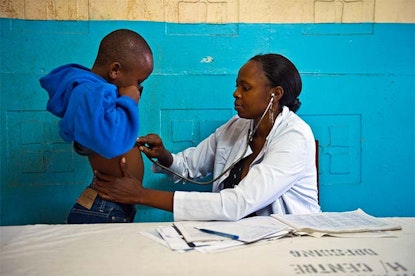A new generation of action promises to open up government contracting in Africa

This blog is published jointly with the World Bank Governance Blog.
I have worked on public procurement and governance for most of my life. But I have never been more excited to finally have a solution at hand that has potential to change the legacy of opaqueness, fraud and lack of effectiveness in public contracting in many African countries.
Africa still need billions in investments to build infrastructure and provide quality services to its citizens, many of them vital: health care centers, food for school children, water services and road to help farmers market their produce. Investments as part of the Sustainable Development Goals in infrastructure alone carries a price tag nearly $100 billion a year. Unfortunately, like in many countries around the world, public contracting in Africa has been characterized by poor planning, corruption in picking contractors and suppliers and contracts are poorly managed.
But the good news is that this is changing. The series of blogs I’m kicking off will highlight the shifting of the norm towards open contracting in Africa.
Ghana and Zambia, among others, are committed to implementing open contracting reforms. African civil society is getting engaged across the region. A new working group hosted by the African Freedom of Information Centre with members from Kenya, Nigeria, and Uganda has been formed to promote open contracting as a solution to end corruption in government contracts across Africa.
Open contracting promises to change the dynamics of public contracting by moving the default of government contracting from opaqueness to openness. Open contracting is an approach that promotes publicly disclosure of timely information throughout the public procurement cycle, i.e., from planning to contract award (including the contracts) to payment and delivery. Preferably, this information should be disclosed in open data, machine readable formats thus facilitating engagement and participation and engagement by business and citizens.
As examples of the emerging norm towards greater openness, the Africa Freedom of Information Center in Uganda is monitoring infrastructure at community levels. The Public Private Development Center in Nigeria has developed a web platform to monitor government spending. This platform, called Budeshi which means open it in Hausa, is tracking contracts for health centers and school construction. Kenya and Malawi are already considering adopting this platform.
The region’s politicians and civil society will meet in May at the Open Government Partnership Summit in Cape Town to discuss reform for more open government in Africa. Open contracting is one of the great ideas that will be on the table.
This is why I believe that a commitment to opening up government contracting in Africa is going to be a powerful towards ensuring that public expenditures will be spent better and deliver better results in the future. Three quick points:
- Corruption continues to hamper development and puts lives of millions at risk when vital services fail to materialize. For example, a recent inquiry into Uganda’s National Roads Authority discovered that billions were paid to non-existing firms and double payments were common. These problems are not new. In 2012 the Inspectorate of Government found that 99% of contracts overshot original budgets while the Public Procurement Regulatory Authority reported that two out of three contracts are not completed on time. A key use case for open contracting is the opportunity to shine a light on potential hotbeds of corruption like these. Where transparency shines, prosperity will grow.
- Open contracting makes sure everyone involved in public procurement, i.e., governments, business and citizens have the same information at hand to engage constructively in finding appropriate solutions to identified problems.
- With open data at the core, government contracting information can be made actionable by developing tools to analyze and sift through contracts, improve access and notifications for companies who want to grow their business with government, and, finally, monitor that contractors deliver on what they are paid for.
Ultimately, the shifting of the norm towards open contracting will result in better projects and higher quality services for citizens of Africa.
I am delighted to kick off this series of blog posts of bright spots of open contracting in Africa that can help define the future for my continent. Stay tuned for these exciting open contracting stories from around the region.